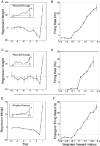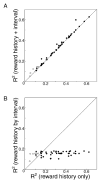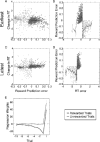Midbrain dopamine neurons encode a quantitative reward prediction error signal
- PMID: 15996553
- PMCID: PMC1564381
- DOI: 10.1016/j.neuron.2005.05.020
Midbrain dopamine neurons encode a quantitative reward prediction error signal
Abstract
The midbrain dopamine neurons are hypothesized to provide a physiological correlate of the reward prediction error signal required by current models of reinforcement learning. We examined the activity of single dopamine neurons during a task in which subjects learned by trial and error when to make an eye movement for a juice reward. We found that these neurons encoded the difference between the current reward and a weighted average of previous rewards, a reward prediction error, but only for outcomes that were better than expected. Thus, the firing rate of midbrain dopamine neurons is quantitatively predicted by theoretical descriptions of the reward prediction error signal used in reinforcement learning models for circumstances in which this signal has a positive value. We also found that the dopamine system continued to compute the reward prediction error even when the behavioral policy of the animal was only weakly influenced by this computation.
Figures









References
-
- Al-Ruwaitea AS, Chiang TJ, Ho MY, Bradshaw CM, Szabadi E. Effect of central 5-hydroxytryptamine depletion on changeover behaviour in concurrent schedules of reinforcement. Psychopharmacology (Berl) 1999;144:264–271. - PubMed
-
- Bush, R.R., and Mosteller, F. (1955). Stochastic Models for Learning (New York: Wiley).
-
- Cools R, Barker RA, Sahakian BJ, Robbins TW. Enhanced or impaired cognitive function in Parkinson’s disease as a function of dopaminergic medication and task demands. Cereb Cortex. 2001;11:1136–1143. - PubMed
-
- Daw ND, Kakade S, Dayan P. Opponent interactions between serotonin and dopamine. Neural Netw. 2002;15:603–616. - PubMed
-
- Deakin JF. Roles of brain serotonergic neurons in escape, avoidance, and other behaviors. J Psychopharmacol. 1983;43:563–577.
Publication types
MeSH terms
Substances
Grants and funding
LinkOut - more resources
Full Text Sources
Other Literature Sources

